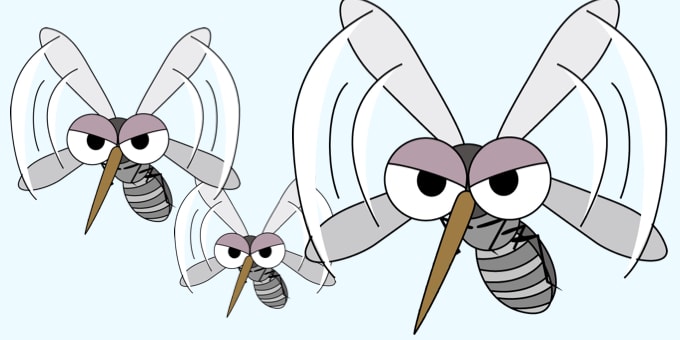BUGGED BY MOSQUITOES?
Summer in Wisconsin is a wonderful time to be outside and explore all the natural beauty our state offers. We relish leaving home without a jacket or coat letting our skin feel the warmth. All this exposed skin becomes a giant buffet for mosquitoes unless you take measures to keep yourself off the menu.
HOW THEY FIND YOU
When you exhale you emit carbon dioxide that is then carried on the breeze. CO2 also seeps from your skin. Why is that a problem? Mosquitoes are attracted to it as well as the warmth and humidity your body gives off and certain chemicals in your sweat. Moving around also helps them zero in on their target. Besides staying indoors or a screened in space, there are options out there today that work in masking the signals we emit.
DEET
DEET, or diethyltoluamide is one of the oldest and most effective mosquito repellents around. It was first developed for use by the U.S. Army. and then made available to the public a decade later. Few of the other products out there compare to DEET. Along with picardin, it is one of the two ingredients in mosquito repellents the CDC has recommended for preventing mosquito-borne diseases and are more effective than other repellents.
We’ve learned why they like us but one of the most important aspects is the lactic acid we emit. There are certain receptors on the antennae of female mosquitoes that hone onto this lactic acid and nothing else. DEET renders the nerves connected to these receptors useless which in turn blinds the female mosquito to your presence, despite your body heat, carbon dioxide and chemicals on your skin.
A study was published in the New England Journal of Medicine in 2002, where researchers compared several types in laboratory tests. Volunteers took turns sticking an arm treated with repellent into a cage full of hungry mosquitoes and noted of how long it took a mosquito to take a bite. An important tip they uncovered is that mosquito repellents only work on the surfaces that it is directly applied to. Mosquitoes were happy to bite skin only four centimeters away from areas without repellent. Of all the repellents tested “OFF! Deep Woods” which contains about 24% DEET, fared the best. Its protection lasted an average of five hours.
Do not confused DEET with the now banned DDT – they are not alike. The EPA (Environmental Protection Agency) found that DEET is very safe when used according to the directions on label, and it’s not classified as a carcinogen (cancer-causing agent). Directions will tell you to apply it only once a day to exposed skin and outerwear and not under your clothing where it can absorbed into the skin more easily, possibly causing irritation. It can also irritate your eyes, so be careful when applying sprays.
The American Academy of Pediatrics issued a statement that DEET is safe for children aged two months and older although they shouldn’t be allowed to apply it themselves. The academy also raised the maximum DEET concentration for kids from 10% to 30%. It is always wise to follow the guidelines on any repellent product.
NATURAL CHOICES
Fire
Ever sat around a campfire and noticed that the mosquitoes seem to stay away? It works because mosquitoes don’t like being around smoke. You can use candles, citronella candles, or sit around a relaxing fire on a summer night.
Lemon Eucalyptus Oil
The CDC (Centers for Disease Control) has recommended lemon eucalyptus oil. They state that it offers protection similar to products with a low concentration of DEET. For fighting off mosquitoes as well as ticks a 40% or higher concentration is recommended.
Garlic
This pungent herb can keep mosquitoes away, many people swear that it works. Although there hasn’t been a lot research to back up this claim. If you’re worried about the smell, chew a sprig of fresh parsley after eating.
Peppermint Essential Oil
Peppermint acts as a natural insecticide to repel mosquitoes, and it’s effective. Published research in the Malaria Journal of March of 2011, discovered it offered repellent action when applied to exposed areas of the body. It also demonstrated larvicidal properties. After exposure to a solution of pure peppermint oil and water 24 hours the mosquito larvae were killed. Grow your own peppermint and you’ll have ready access to be able to crush a few of the leaves from the plant, releasing the scent and oils.
Fan
A large fan on your patio or deck can work since mosquitoes are weak fliers. A fan’s breeze also disperses those things mentioned above that allow female mosquitoes (the biting gender) to find us. Entomologists from Michigan State University found that the wind from a fan greatly reduced mosquitoes and recommend it’s use in our backyards to protect ourselves and our pets.
A GOOD DEFENSE
The best way to keep swarms of mosquitoes at bay is to get rid of standing water where mosquitoes lay their eggs. Some species lay their eggs directly in stagnant water while others will find kiddie pools, birdbaths, among other places. When you dump the water out be sure to scrub out those containers, dumping won’t dislodge the eggs that are attached along the sides.
Enjoy summer and being outdoors. Viking Village Foods is stocked with a wide variety of choices to keep you from being bugged!











